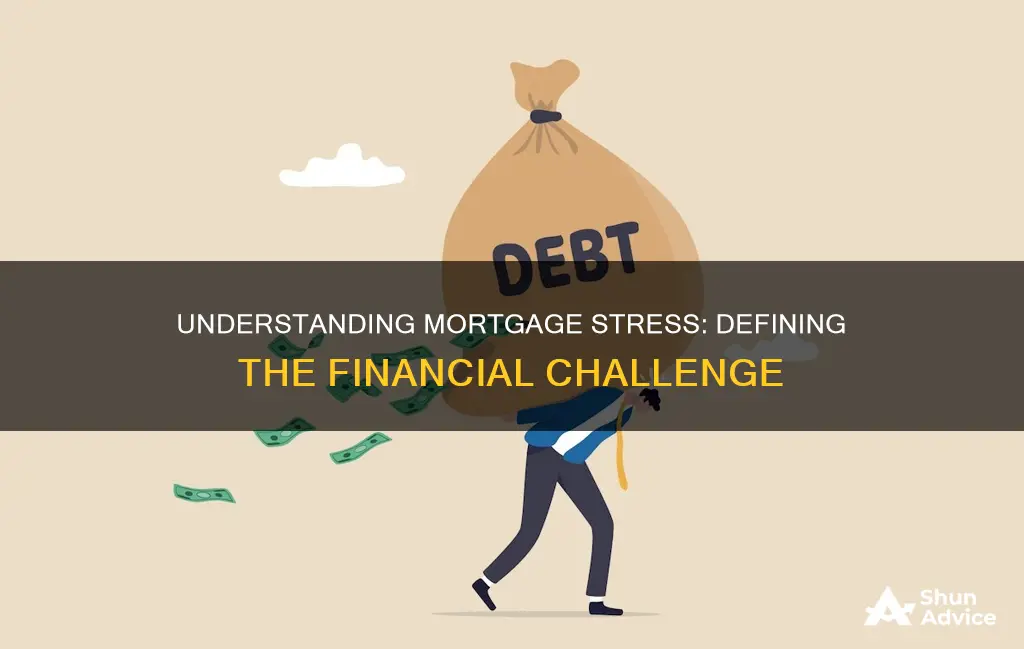
Mortgage stress is a term used by economists and property experts to describe a situation in which a household struggles to meet its mortgage repayments. While there is no official definition of mortgage stress, it is generally understood to occur when a household spends more than 30% of its pre-tax income on mortgage repayments. This can lead to financial stress and difficulty in meeting basic needs such as groceries, medical needs, and transport. Mortgage stress can be caused by various factors, including interest rate rises, job loss, and unexpected expenses. It is important for homeowners to seek help and take action if they find themselves in mortgage stress, as it can have significant physical, psychological, and social consequences.
What You'll Learn

Quantitative definition
While there is no official definition of mortgage stress, it is generally understood to be when a household spends more than 30% of its pre-tax income on mortgage repayments. This threshold has been used by organisations such as the Australian Bureau of Statistics and Digital Finance Analytics. However, some sources place the threshold at 35% of gross household income. This stress can be alleviated if the mortgagor has the capacity to increase their income or is ahead on payments, creating a buffer to offset increased interest obligations.
Mortgage stress is a financial burden that can lead to negative physical, psychological, and social consequences. It can cause households to sacrifice other expenses to keep up with their mortgage repayments and maintain their dream of homeownership. This can include struggling to afford basic necessities such as groceries, utilities, medical needs, and transport. It can also lead to social withdrawal, as individuals may no longer be able to afford luxuries or social activities that cost a fee.
The risk of mortgage stress is higher when there are increases in interest rates, causing higher monthly mortgage repayments. Inflation also contributes to mortgage stress by driving up the cost of goods and services, leaving households with less disposable income. Other factors that can lead to mortgage stress include job loss, reduced working hours, or unexpected bills.
Calculators and budget planners are available to help individuals assess their risk of mortgage stress. These tools allow users to experiment with different income levels and expenses to determine their financial stability. Seeking professional advice and support is crucial when experiencing extreme financial stress.
Paying Off My Mortgage: Strategies for Early Freedom
You may want to see also

Non-numerical measurements
While mortgage stress is commonly defined as spending more than 30% of one's pre-tax income on mortgage repayments, there are also non-numerical measurements to consider. These signs are subjective and vary depending on an individual's circumstances, but they can be powerful indicators of financial anxiety.
One sign of mortgage stress is no longer being able to afford luxuries such as dining out, going to the cinema, or ordering takeaway. Similarly, withdrawing from social activities that require a fee may be a sign of financial difficulty. If you find yourself living paycheck to paycheck, unable to budget for unexpected expenses, and relying on friends, family, credit cards, or personal loans to make ends meet, you may be experiencing mortgage stress.
Psychological factors can also indicate mortgage stress. For example, the fear of unknown interest rate increases can prompt a household to reduce spending, which, in the aggregate, can impact GDP and the general demand for goods and services. This can have a direct impact on mental health, leading to relationship problems, depression, and anxiety.
It is important to note that these non-numerical measurements are subjective and may vary depending on an individual's financial situation, household spending, and other variables. However, they can provide valuable insight into the stress and anxiety associated with mortgage repayments.
Mortgages: A Fraudulent Trap for the Unwary Homeowner
You may want to see also

Calculating risk
There is no universally agreed-upon definition of mortgage stress, but it is generally understood to occur when a household spends more than 30% of its pre-tax income on mortgage repayments. This threshold is used by organisations such as the Australian Bureau of Statistics, and Digital Finance Analytics. However, it is important to note that this is a generalised measure, and mortgage stress can occur even if a household is spending less than 30% of its income on repayments.
The risk of mortgage stress can be calculated using a simple formula that compares a household's income to its mortgage repayments. This calculation can be done using a mortgage stress test or a budget planner calculator. By inputting different variables, such as income and expenses, these tools can help determine the percentage of income that goes towards the mortgage and identify potential financial risks.
For example, if a household has a pre-tax monthly income of $7,000 and pays $2,100 per month on their mortgage, they are spending 30% of their income on repayments. This would indicate a potential risk of mortgage stress. It is important to note that this calculation should also consider other expenses and the potential for income reduction or interest rate increases.
Additionally, it is worth considering the impact of interest rate hikes, which can significantly increase monthly repayments. For instance, an Australian with a $500,000, 25-year mortgage would pay an extra $76.45 per month for every 0.25% increase in interest rates. This added cost can push households into mortgage stress, as it reduces their disposable income and ability to meet other financial obligations.
To avoid mortgage stress, it is crucial to understand your financial limits and stick to a budget. Tools like an offset sub-account can help reduce interest charges and the length of the loan. Seeking professional advice and support services can also help manage financial stress and find solutions, such as refinancing or negotiating more manageable repayment options with lenders.
Mortgage Repayment: Understanding the Basics of Repayment Plans
You may want to see also

Impact of interest rates
While there is no official definition of mortgage stress, it generally refers to a situation where a household spends a disproportionate amount of its income on mortgage repayments, often exceeding 30% of their pre-tax income. This can result in financial strain and difficulty in covering other essential expenses. The increase in interest rates has had a significant impact on the prevalence of mortgage stress in several ways.
Firstly, rising interest rates have directly contributed to higher mortgage repayments, exacerbating the financial burden on households. For example, the 0.25% interest rate hike in October resulted in an additional $76.45 in monthly repayments for the average Australian with a $500,000, 25-year mortgage. This increase in repayments can quickly push households into mortgage stress territory, especially when coupled with other factors such as rising living costs and inflation.
Secondly, the recent interest rate hikes have come as a shock to many mortgagees who had previously benefited from the low-interest rates offered during the COVID-19 pandemic. During the pandemic, the Reserve Bank provided banks with cheap three-year fixed-rate credit, which resulted in once-in-a-generation cheap fixed-rate loans for borrowers. As these low-interest rates expired, many mortgagees were faced with significantly higher repayments, contributing to the growing number of households experiencing mortgage stress.
The impact of interest rate increases on mortgage stress is evident in the statistics. According to Roy Morgan, there were approximately 1.01 million mortgage holders at risk of mortgage stress in the last quarter of 2022. Following the interest rate hikes, this number increased to 1.63 million mortgage holders at risk by the end of 2023, with 987,000 considered "extremely at risk." This represents a significant rise in mortgage stress since May 2022, when the RBA began raising interest rates.
Moreover, the fear of unknown interest rate increases can cause a psychosomatic response, leading households to reduce their spending in anticipation of higher mortgage payments. This behaviour, when considered at the aggregate economic level, can impact GDP and the demand for goods and services. It is one of the reasons why the Reserve Bank increases interest rates – to slow down the speed of price increases in the economy by limiting the capacity for credit-fuelled consumption.
While interest rates play a significant role in mortgage stress, it is important to note that other factors also contribute to this complex issue. These factors include job loss, reduced working hours, unexpected bills, and rising living costs. Additionally, individual circumstances, such as income level, expenses, and living arrangements, can also influence the experience of mortgage stress. Various resources and support services are available to help households experiencing or at risk of mortgage stress.
Mortgage Pre-Approval: Essential Step for Home Loan Success
You may want to see also

Managing mortgage stress
Think ahead and be realistic
The best way to avoid mortgage stress is to plan and be realistic about your financial situation. When choosing a home, assess what you can comfortably afford and ensure your home loan can be easily repaid. Consider whether you have sufficient funds to take on a loan and set up an emergency fund for unexpected financial difficulties. Regularly assess your home loan to determine if it still aligns with your financial capabilities and take advantage of lower interest rates if possible.
Seek professional advice
Consider reaching out to loan specialists or financial counsellors who can provide valuable insights and guidance. They can help you explore options such as refinancing, changing lenders, or restructuring your loan to make repayments more manageable. Financial counsellors can be accessed through services like the National Debt Helpline or the Financial Counselling Australia website.
Utilize financial tools
Use financial tools such as a budget planner calculator or a mortgage stress calculator to analyse your financial situation and identify areas where you can reduce expenses or adjust your budget. These tools allow you to experiment with different scenarios and help you make informed decisions.
Explore repayment options
Discuss options with your lender to make loan repayments more manageable. This could include reducing repayments to the minimum amount, changing the frequency of payments, or accessing excess funds in your offset or off-set account. You may also consider swapping to interest-only repayments for a temporary period to reduce costs.
Offset sub-account
Consider having an offset sub-account linked to your home loan. This allows you to offset the loan balance with the amount in your sub-account, reducing the interest charged on your loan. As a result, more of your monthly repayments go towards paying off the principal, potentially shortening the length of your loan and saving you money.
Remember, managing mortgage stress depends on your personal circumstances, and it's important to seek professional advice to find the best approach for your situation.
Mortgage Approval: What Factors Determine Your Eligibility?
You may want to see also
Frequently asked questions
Mortgage stress is the term used by economists and property experts to describe when a household struggles to meet its mortgage repayments. It is generally understood that mortgage stress occurs when a household spends more than 30% of its pre-tax income on mortgage repayments. However, there is no official definition of mortgage stress.
Signs of mortgage stress include no longer being able to afford luxuries such as dining out or going to the cinema, withdrawing from social activities that cost money, and living paycheck to paycheck. If you are unable to budget for unexpected expenses, such as a medical bill or car service, you may also be experiencing mortgage stress.
If you are experiencing mortgage stress, it is important to take action before you fall into arrears. You can use a budget planner calculator to experiment with different levels of income and expenses and determine at what point you may struggle financially. You may also want to consider contacting your lender to discuss ways to make loan repayments more manageable, or seeking free financial counselling services.







